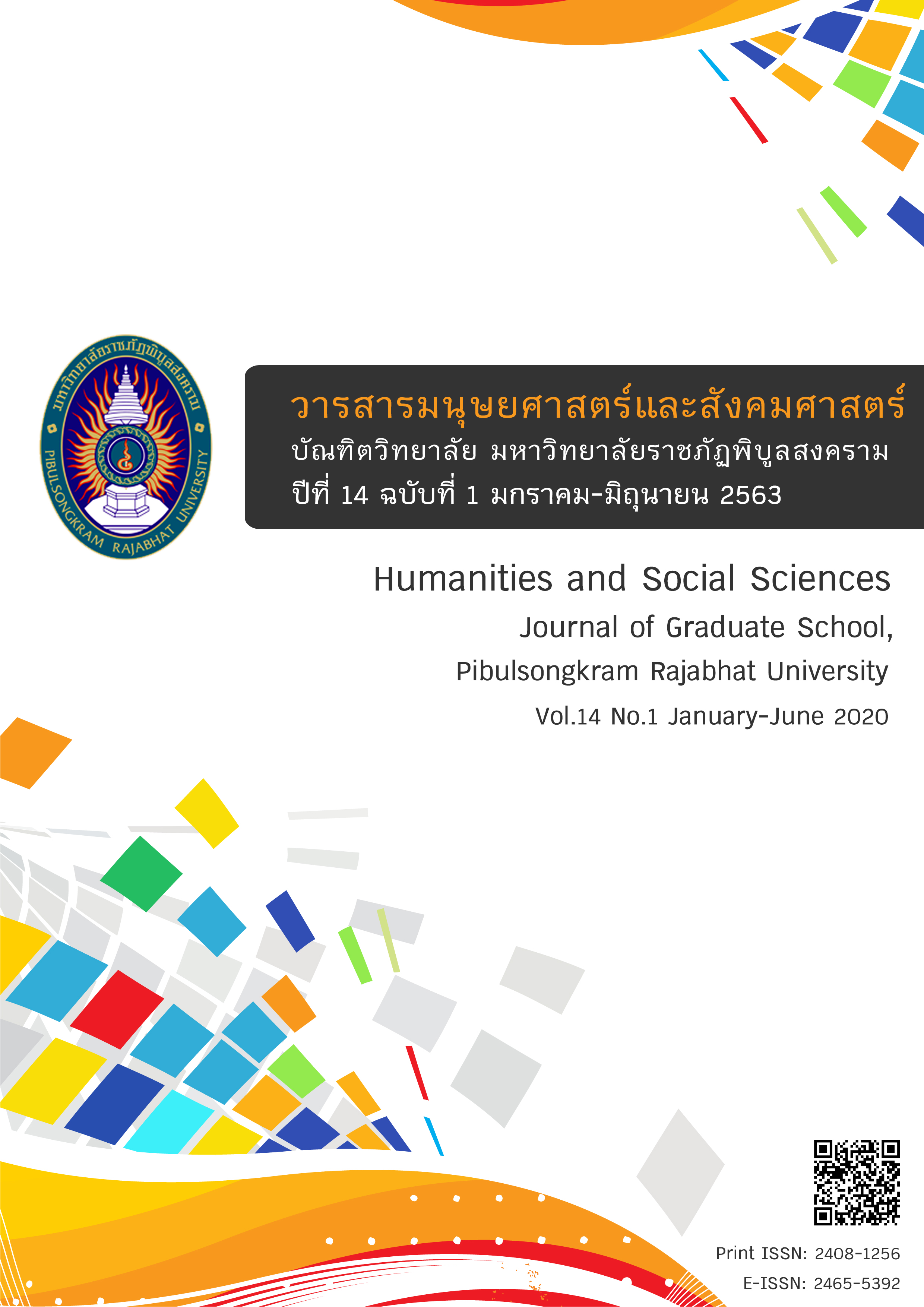Development of a Direct Current Training Course by KidBright to Promote Essential Skills in the 21st Century for 11th Grade students, Khunkuanwiththayakhom School, Phayao Province
Keywords:
Development of training course, Training course, Direct current, Essential skills in the 21st centuryAbstract
The objectives of this research were 1) to develop and evaluate the efficiency of a direct current training course by KidBright to promote essential skills in the 21st century, 2) to compare the learning achievement before and after using a direct current training course by KidBright, and 3) to study the satisfaction of the students towards a direct current training course by KidBright. The samples of this study were 30 eleventh grade students in the first semester of academic year 2019 from Khunkuanwiththayakhom School, Phayao Province by simple random sampling. The data were collected by using 1) the training course to enhance essential skills in the 21st century, 2) the assessment of cognitive and practical skills (pre- and post-testing) for learning and innovation in the 21st century, and 3) the satisfaction questionnaire of the training courses and analyzed by using percentage, mean, standard deviation and dependent t-test. The results found that the development and evaluation efficiency of a direct current training course by KidBright to promote essential skills in the 21st century in both knowledge and practical skills, the developed training course comprised 4 units: behavioral content, media, activities and evaluation. The results of this training course checked by academic experts in terms of quality were found that it was at the highest level with the consistency between behavioral objectives and content at the high level at 0.67-1.00. The efficiency of the training course showed high achievement at 83.25/87.00 which was higher than the established requirement of 80/80. After the actual implementation, the students had the knowledge and understanding in 21st century learning and innovation skills by using the KidBright board as a teaching material after the training higher than before the training at .05 level of significance. The achievement scores of the students learning a direct current with KidBright showed the high cognition and practice with values of 80.33 and 87.43, respectively and the students’ satisfaction towards the training course was at the highest level.
References
กระทรวงศึกษาธิการ. (2552). หลักสูตรแกนกลางการศึกษาขั้นพื้นฐาน พุทธศักราช 2551. กรุงเทพฯ: โรงพิมพ์ชุมนุมสหกรณ์การเกษตรแห่งประเทศไทย.
จรัญ กาญจนประดิษฐ์. (2554). พัฒนาการทักษะการเป่าขลุ่ยเพียงออโดยใช้รูปแบบการสอนทักษะปฏิบัติของเดวีส์ (Davies’ Instruction Model for Psychomotor Domain) และสอดแทรกคุณธรรม ด้านความเพียรของนักศึกษาที่เรียนรายวิชา 864382 ทักษะดนตรีไทย 2. วารสารศิลปกรรมศาสตร์ มหาวิทยาลัยขอนแก่น, 3(2), 93 -117.
โชติกา ภาษีผล. (2559). การวัดและประเมินผลการเรียนรู้. กรุงเทพฯ: โรงพิมพ์แห่งจุฬาลงกรณ์มหาวิทยาลัย.
ณัติเทพ พิทักษานุรัตน์. (2542). เทคนิคการฝึกอบรมและพัฒนา. อุดรธานี: คณะวิทยาการจัดการ สถาบันราชภัฏอุดรธานี.
ทิศนา แขมมณี. (2555). ศาสตร์การสอน : องค์ความรู้เพื่อการจัดการกระบวนการเรียนรู้ที่มีประสิทธิภาพ (พิมพ์ครั้งที่ 6). กรุงเทพฯ: จุฬาลงกรณ์มหาวิทยาลัย.
ธนวัฒน์ ศรีไพโรจน์, ดุษฎี โยเหลา และปิยดา สมบัติจินดา. ( 2561). อิทธิพลของโปรแกรมการโค้ชการจัดการเรียนรู้โดยใช้โครงงานเป็นฐานที่มีต่อสมรรถนะของครูผู้สอน. Veridian E-Journal, Silpakorn University, 11(2), 96-110.
บุญชม ศรีสะอาด. (2543). วิธีการทางสถิติสำหรับการวิจัย (พิมพ์ครั้งที่ 6). กรุงเทพฯ: สุวีริยาสาสน์.
ประภัสสร เพชรสุม, อภิณห์พร สถิตภาคีกุล และกตัญญุตา บางโท. (2560). ผลการจัดการเรียนรู้โดยใช้วิธีการแบบเปิดที่มีต่อความสามารถในการแก้ปัญหาทางคณิตศาสตร์ของนักเรียนชั้นมัธยมศึกษาที่ 2. วารสารวิชาการบัณฑิตวิทยาลัย มหาวิทยาลัยราชภัฏนครราชสีมา, 15(1), 80-87.
วรพจน์ วงศ์กิจรุ่งเรือง และอธิป จิตตฤกษ์. (2556). ทักษะแห่งอนาคตใหม่ : การศึกษาเพื่อศตวรรษที่ 21
แปลจาก 21st Century Skills: Rethinking How Students Learn. สืบค้น 21 มิถุนายน 2554, จาก http://openworlds.in.th/books/21st-century-skills/
วารุณี อัศวโภคิน. (2554). การพัฒนาหลักสูตรฝึกอบรมการใช้ภาษาอังกฤษเพื่อการสื่อสารของบุคลากรสายสนับสนุนวิชาการ มหาวิทยาลัยศรีนครินทรวิโรฒ (วิทยานิพนธ์ปรัชญาดุษฎีบัณฑิต). มหาวิทยาลัยศรีนครินทรวิโรฒ, กรุงเทพฯ.
วิจารณ์ พานิช. (2555). วิถีสร้างการเรียนรู้เพื่อศิษย์. กรุงเทพฯ: ตถาตา พับบลิเคชั่น.
__________. (2556). การสร้างการเรียนรู้ในศตวรรษที่ 21. กรุงเทพฯ: ส. เจริญการพิมพ์.
วิจิตร อาวะกุล. (2550). การฝึกอบรม. กรุงเทพฯ: ศูนย์หนังสือจุฬาลงกรณ์มหาวิทยาลัย.
วิชัย วงษ์ใหญ่. (2554). การพัฒนาหลักสูตรระดับอุดมศึกษา. กรุงเทพฯ: อาร์ แอนด์ ปริ้นท์.
วิภาพรรณ กนิษนาคะ. (2542). การพัฒนาบุคคลและฝึกอบรม. กรุงเทพฯ: คณะวิทยาการจัดการ สถาบันราชภัฏสวนสุนันทา.
วิภาวี ศิริลักษณ์, ปกรณ์ ประจันบาน และเทียมจันทร์ พานิชย์ผลินไชย. (2557). การพัฒนาตัวบ่งชี้ทักษะของนักเรียนในศตวรรษที่ 21. วารสารการศึกษาศาสตร์ มหาวิทยาลัยนเรศวร, 16(4), 155-165.
สถาบันส่งเสริมการสอนวิทยาศาสตร์และเทคโนโลยี. (2557). คู่มือหลักสูตรอบรมครูสะเต็มศึกษา. กรุงเทพฯ: กระทรวงศึกษาธิการ.
สำนักงานคณะกรรมการการอุดมศึกษา. (2559). สกอ.พัฒนานักศึกษาสู่ Thailand 4.0. อนุสารอุดมศึกษา, 43(462), 11-13.
สมศักดิ์ ภู่วิภาดาวรรธน์. (2544). การยึดผู้เรียนเป็นศูนย์กลางและการประเมินตามสภาพจริง. เชียงใหม่: The Knowledge Center.
สิริมณี บรรจง. (2553). การพัฒนาทักษะการเรียนรู้ของนักศึกษาโดยใช้วิธีการสอนที่เน้นทักษะปฏิบัติ. กรุงเทพฯ: คณะครุศาสตร์ มหาวิทยาลัยราชภัฏสวนสุนันทา.
อรุณรุ่ง โยธสิงห์. (2559). การพัฒนาหลักสูตรฝึกอบรมตามแนวคิดการเรียนรู้แบบผสมผสานเพื่อเสริมสร้างสมรรถนะด้านการประเมินที่เน้นผู้เรียนเป็นสำคัญของครูผู้สอนระดับประถมศึกษา. วารสารศิลปากรศึกษาศาสตร์วิจัย, 8(2), 270-284.
อังคณา เรืองชัย. (2555). การพัฒนาหลักสูตรฝึกอบรมระยะสั้น เรื่อง การทำน้ำสมุนไพรเพื่อเป็นอาชีพเสริมในครอบครัว (วิทยานิพนธ์ศึกษาศาสตรมหาบัณฑิต). มหาวิทยาลัยเทคโนโลยีราชมงคลธัญบุรี, ปทุมธานี.
อาทิตย์ จิรวัฒนผล. (2560). การพัฒนาหลักสูตรฝึกอบรมการจัดการเรียนรู้รายวิชาชีพช่างอุตสาหกรรมที่ส่งเสริมการคิดวิเคราะห์ด้วยบทเรียนแสวงรู้บนเว็บ (WebQuest). Technical Education The Journal of King Mongkut's University of Technology North Bangkok, 8(1), 17-25.
Taba, H. (1962). Curriculum Development: Theory and Practice. New York: Harcourt, Brace & World.
Downloads
Published
How to Cite
Issue
Section
License
Any articles or comments appearing in the Journal of Humanities and Social Sciences, Rajabhat Phibulsongkram University, are the intellectual property of the authors, and do not necessarily reflect the views of the editorial board. Published articles are copyrighted by the Journal of Humanities and Social Sciences, Rajabhat Phibulsongkram University.









